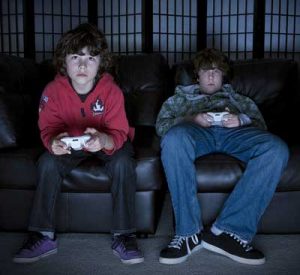Proposal to tax video games dropped by legislator
 With every school shooting, the conversation linking violence and video games resurfaces. The latest incident in Parkland, Florida was no exception. In some circles, video games were once again the suspected culprit. But, are they inextricably intertwined with violent crime?
With every school shooting, the conversation linking violence and video games resurfaces. The latest incident in Parkland, Florida was no exception. In some circles, video games were once again the suspected culprit. But, are they inextricably intertwined with violent crime?
Shortly after the Florida shooting, Rhode Island Representative Robert Nardolillo (R-Coventry) proposed legislation taxing violent video games that are rated “mature” or higher using the subsequent revenue to fund school mental health counseling.
He cited evidence that exposure to violence in young children indicates a likelier tendency toward aggressive behavior.
Congressman Tom MacArthur (R) of New Jersey agreed with Nardolillo’s assessment when he released this statement:
“Hollywood glorifies violence, the media makes its perpetrators famous, and the video game industry creates ever more realistic virtual games, where killing is a form of entertainment. Sick and troubled people feed off of this.”
The American Psychological Association put out a policy statement in 2015 confirming the connection between violent video games and aggression.
(However, the APA acknowledged that insufficient evidence exists about whether it extends to violent crime).
And, President Donald Trump echoed those beliefs in a press conference when he said, “I’m hearing more and more people say the level of violence on video games is really shaping young people’s thoughts.”
But in the weeks since the shooting, Nardolillo has changed his position. He released this statement by email:
“My initial press release sparked a nation-wide conversation about the role of video games and aggression in children. Some saw my measure as an innovative solution to a complex problem while others raised potential challenges on the grounds of free speech…
I still feel that there is a need to fund mental health counseling in schools, but I do not want to infringe on the constitutional rights of any citizen to do so. I will continue to look for new ways to make Rhode Island schools a more peaceful environment for our children. I will not be submitting my proposal.”
James Ivory, Ph.D, associate professor of communications at Virginia Polytechnic Institute and State University, in which a shooting took place in 2007, has based his research on the social and psychological impact of communication technologies, specifically video games.
He knows why Nardolillo walked back his original statement.
“You can’t tax by content. It’s unconstitutional,” he explained. “Taxing one type of content over another—that’s the kind of thing that the First Amendment protects. You could blanket tax all video games regardless of rating, but you can’t be target specific.”
Ivory added that he is sure Nardolillo meant well, showing his constituents that he was willing to do something about gun violence by attacking video games as its source. But there’s one small problem: research shows no association between violent media and violent crime.
“The thing is, school shooters don’t have unique habits with media use more or less than the average male,” said Ivory. “In fact, in the past several years as more and more video games have been released—each one more violent than the other—youth crime has gone down.”
Studies going back as far as 2002 illustrated the link between video games and violence was tenuous at best. Most concluded violent media is not a predictor of violent crime.
“We often choose violent media,” said Ivory,” as a simple explanation to make sense of something senseless.”
